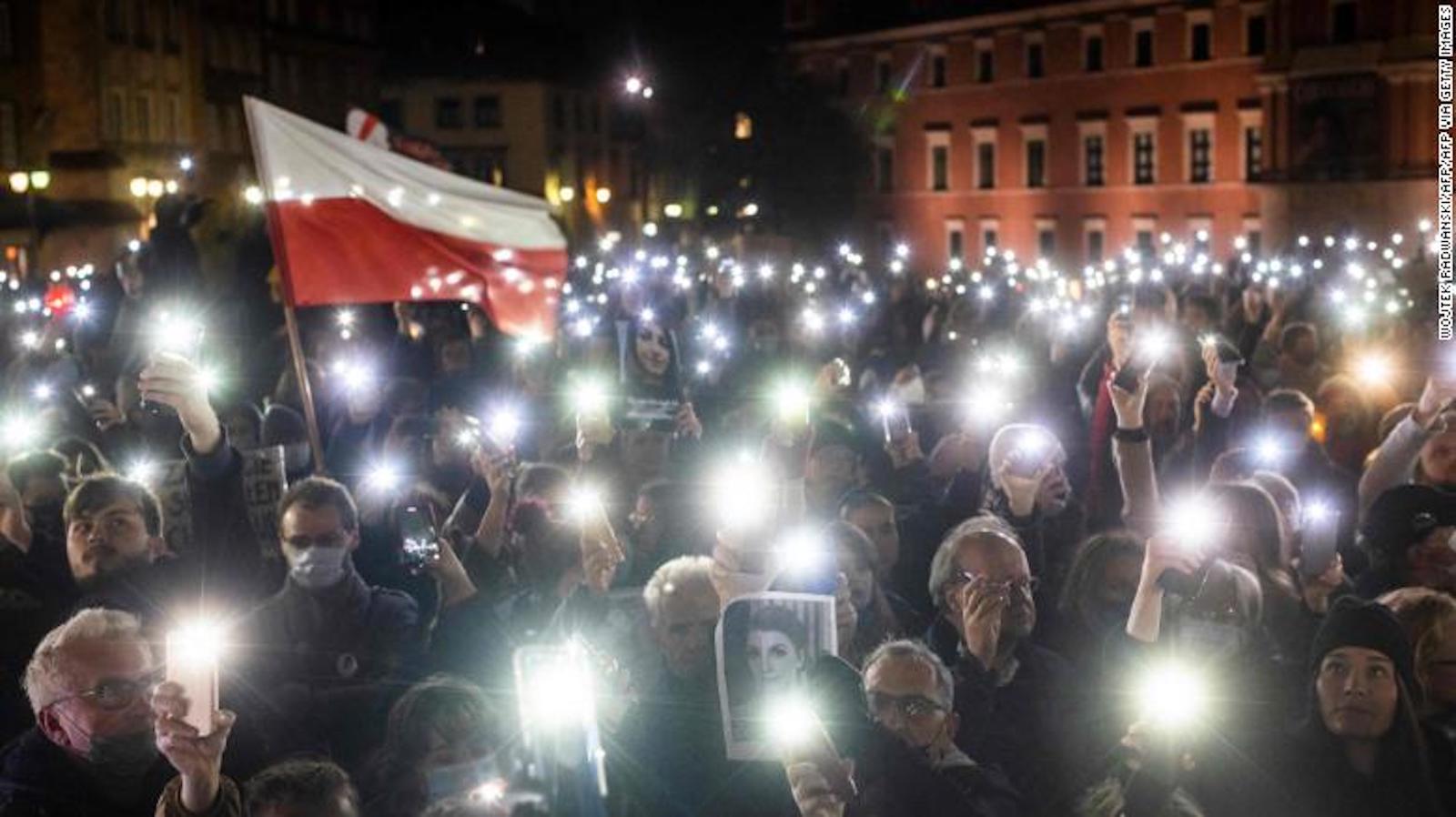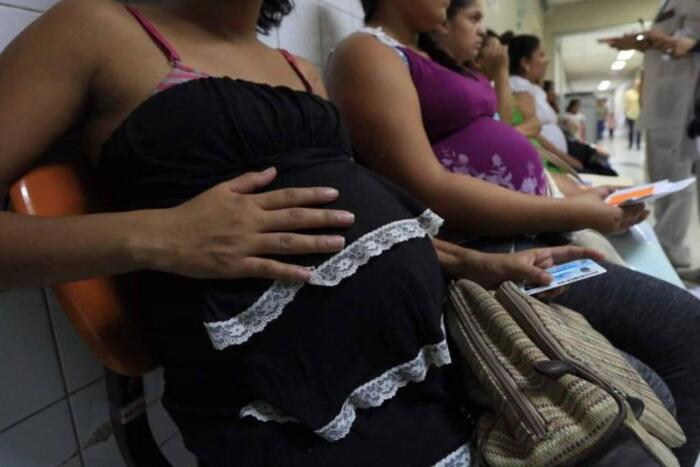What would happen if the right to abortion in the US is annulled?
2:27
London (CNN) --
Tens of millions of women in the United States are on the verge of losing access to abortion, according to a draft document that appears to show the US Supreme Court decided to overturn the landmark Roe ruling. vs.
Wade who legalized the procedure throughout the country.
Such a move, to overturn the ruling, would represent a dramatic reversal of decades of precedent that would isolate the United States from most of the developed world on reproductive rights.
On Monday, Politico published a draft opinion from the Court indicating that a majority of the justices would vote to strike down the landmark 1973 ruling known as Roe vs.
Wade, who established the right to abortion throughout the country.
The final decision will not be announced until this summer.
The court's public affairs office confirmed Tuesday that the document is "authentic," but stressed that "it does not represent a decision of the court or the final position of any member on the issues in the case."
These are the US states where the right to abortion would be under threat if Roe vs.
Wade
Official opinion would reverberate around the world.
It would firmly counter a global trend toward freer access to abortion and place the United States in a very small club of countries that have moved to restrict access in recent years.
advertising
Several US states have already undermined the availability of the procedure;
if parts of the United States are allowed to do away with it entirely, the country would become home to some of the strictest abortion laws in the Western world.
This is how the US would compare to the rest of the world on the issue of abortion.
OPINION |
The real reason America is going against the grain on abortion
How many women in the US would lose the right to an abortion?
1:03
Some US allies have greater access to abortion
Currently the US is one of the 56 countries where abortion is legal at the request of the woman, without the need for justification, according to the World Health Organization (WHO).
The country is in the group with other Western countries, as few developed countries ban or heavily restrict access to abortion.
Of the 36 countries that the United Nations Department of Economic and Social Affairs defines as developed economies, all but two (Poland and Malta) allow abortions on demand or for broad health and socioeconomic reasons, according to the Center for Reproductive Rights.
(CRR), which campaigns for better access to abortion and monitors laws around the world.
In these countries abortion is legal (and in these others it is not allowed under any circumstances)
The end of federal protection of abortion in the United States would see parts of the country join that list.
It would also push the country against a global tide that has seen many nations, including those neighboring the United States, liberalize abortion laws in recent years.
Last year, Mexico's Supreme Court ruled unanimously that criminalizing abortion is unconstitutional, in a decision that impacted the precedent for the legal status of abortion throughout the country.
"Never again will a woman or a person with the capacity to gestate a child be criminally prosecuted," Judge Luis María Aguilar said after the ruling.
"Today the threats of imprisonment and the stigma that weigh on people who freely decide to interrupt their pregnancy are banished."
The United States' neighbor to the north, Canada, is one of the few countries that allows abortion at any time during pregnancy.
Prime Minister Justin Trudeau has criticized US moves to make abortions more difficult to access.
Abortion is available in hospitals and private clinics in Canada;
In most cases, the procedure is covered by provincial government health insurance plans, meaning they are essentially free.
But Canada's lack of a national abortion law has led to patchy access to abortion services across the country.
Most European Union countries, including the G7, allow abortion with gestation limits, the most common being the 12-week limit, according to monitoring by charities including the CRR.
Exceptions are generally allowed after that period for certain reasons, such as if the pregnancy or childbirth poses a risk to the mother's health.
Abortion restrictions or special cases in some countries
Opposition to abortion is generally less widespread in other countries than in the United States.
And what is more important, it is rare to find developed countries where abortions are not performed in extreme cases, such as when the woman has been the victim of rape or incest.
Some state laws, like the Mississippi law that the Supreme Court made and on which this decision was based last year, prohibit abortions after 15 weeks, even in those cases.
Anti-abortion protests occasionally take place in countries like the UK, where some councils have responded by reducing the ability of protesters to interact with people entering clinics.
Activists from across the European Union have also called for restrictions to be eased in their countries.
In Germany, for example, abortion is allowed up to 12 weeks of pregnancy, but people requesting the procedure must attend a mandatory counseling session, followed by a mandatory three-day waiting period.
Doctors have also been prosecuted for sharing details about the abortion services they offer because any "advertising" of abortions is prohibited.
Japan, along with countries such as Finland and India, provide for abortion in cases of rape or risk to the woman's health, but also for broader socioeconomic reasons.
In developed countries where abortion is legal, none have set a gestation limit of just six weeks, as did a Texas law that the Supreme Court reviewed last year, according to the CRR.
The court allowed the law to stand in December, but the justices added that abortion providers have the right to challenge the law in federal court.
Among democracies comparative to the US, Australia's laws are among the most similar.
As in the US, access to abortion varies by state and Australian territory, and until recently, some regions criminalized the procedure.
But while some US states have gradually tightened their abortion laws.
Australia has moved in the opposite direction.
Since 2018, the procedure has been decriminalized in both Queensland and New South Wales.
Both states allow access to abortion up to 22 weeks.
South Australia became the latest state to decriminalize abortion this year.
How many countries in the world have decriminalized abortion?
0:46
Some US states could join a handful of regions that make abortion access more difficult
The final opinion of the Supreme Court case is not expected to be published until the end of June.
Votes and language may change before reviews are formally posted.
But if the court goes ahead with its informed decision to overturn Roe v.
Wade, several US states would be expected to quickly restrict or ban abortion.
That would affect the lives and health care of millions of people, raising a host of concerns that are most frequently reported in developing countries.
In countries where abortion is restricted or illegal, the evidence suggests that the number of procedures does not decrease.
Instead, women resort to unsafe abortions, called "clandestine abortions," according to the WHO.
Such dangerous proceedings are a rarity in the Western world, but the potential reversal of Roe v.
Wade could make them more common in the US.
Almost half of abortions worldwide are unsafe, and 97% of unsafe abortions occur in developing countries, says the WHO.
But the United States is not the only nation where the right to abortion is under threat.
In other more socially conservative countries around the world, populist and authoritarian governments have similarly moved to restrict access to the procedure.
Among the most notable in this regard is Poland, where a ban on abortions due to fetal defects went into effect last year, essentially ending nearly all abortions in the country.
Abortion is now only allowed in Poland in cases of rape or incest or when the pregnancy threatens the life of the mother.
The Polish government has made abortion a key issue since coming to power in 2015, appealing to social conservatives in the largely Catholic nation but sparking mass protests in the country's more liberal cities.
Protesters in Warsaw mark the first anniversary of a ruling by Poland's Constitutional Court that imposed a near-total ban on abortion. They commemorate the death of a young pregnant Polish woman who was denied the procedure.
Slovakia tried to follow Poland's example, but the country's parliament rejected several bills proposing restrictions on reproductive rights in the past two years.
And other European countries like Italy have seen extensive use of "conscientious clauses" or "conscientious objections," which allow providers to choose not to offer terminations due to moral objections, according to watchdogs including Human Rights Watch ( HRW).
The situation of abortion in Latin America
In Central and South America, abortion laws are generally strict.
In Brazil, for example, the procedure is illegal except in certain circumstances, such as fetal defects or if the abortion is the result of rape, according to Human Rights Watch.
Women and girls who terminate their pregnancies in other circumstances can face up to three years in prison, says HRW.
In Nicaragua and El Salvador, abortion is completely illegal in all circumstances and prison sentences in the latter country can extend up to 40 years.
“Such laws effectively amount to torture, discrimination and the denial of some of the most basic human rights to life and dignity,” the human rights group Amnesty International said last year, regarding El Salvador.
In recent years some sentences have been overturned, with several women released from jail after serving part of their long sentences.
But other South American states have moved to allow abortion.
Argentina passed a law allowing the procedure in December, while in Chile, where abortion was completely banned until 2017, decriminalization is under discussion.
abortion






/cloudfront-eu-central-1.images.arcpublishing.com/prisa/W33JSXVPKRF7FMDYEETPSPNNKY.jpg)

/cloudfront-eu-central-1.images.arcpublishing.com/prisa/2BJPLFOPENCKDMK6PPADXUU37E.jpg)
